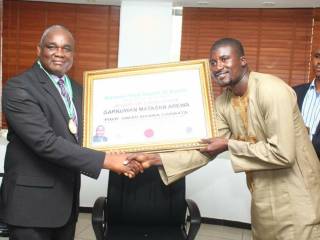"8-Point Agenda Changed the Skyline of Public Administration "
- Northern Youth Council"We will continue to be consumer-centric. Schools Support Programmes Target the Youth"
- Danbatta
While Prof. Umar Danbatta, the CEO of NCC, was meeting with Muhammed Bello, Minister of the Federal Capital Territory (FCT), yesterday, to develop a collaborative partnership for improving provision of telecom services in the FCT, the leadership of the Northern Youth Council of Nigeria (NYCN) visited NCC Head Office to convey Danbatta's nomination as the next recipient of the Sir Ahmadu Bello Platinum Leadership Award.
Abubakar Mohammed, Vice President of NYCN who led the delegation of representatives of NYCN from the 19 Northern States and the FCT to inform Danbatta of his nomination said the Council shares the vision of ONE PEOPLE, ONE COMMON DESTINY devoid of ethnicity, religious intolerance and sectionalism.Mohammed said the Council recognised the challenges in the telecom services such as drop calls and excessive charges on calls and data services by Service Providers, Danbatta is nominated for the Award because of NCC's measurable commitment to redress the challenges as expressed in the implementation of the 8-Point Agenda and the campaigns of the declaration of 2017 as Year of the Nigerian Telecom Consumer. "These have changed the skyline of public administration in Nigeria" Mohammed said.
Reuben Muoka, NCC's Head of Public Relations, who received the NYCN delegation in Danbatta's stead, thanked the NYCN for the nomination and promised to convey the message speedily to his CEO. He said Management of the Commission was aware of the challenges in telecom services and it is the reason many great programmes cited by NYCN were instituted to address those challenges. Importantly, Muoka said NCC's consumer-centric stance underscores its Management's recognition of the consumer as the lifeblood of the telecom industry.
Muoka also informed the delgation from NYCN that youths in particular are Commission's target in the conception and implementation of the CSR initiatives under the School Support Programmes, especially the Digital Awareness Programme (DAP) and the Advanced Digital Appreciation Programme for Tertiary Institutions (ADAPTI) designed to build youth capacity in ICT; as well as the Virtual Examination Centres (VECs) constructed by the Commission and transferred to agencies that administer examinations for use in computer-based tests.

